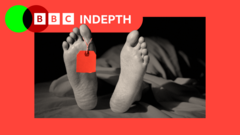In the United States, a complex and largely unregulated market exists for human remains, operating entirely within legal frameworks yet consistently raising significant ethical questions. While the donation of bodies to science is often viewed as a selfless act, a less visible industry thrives on the commercial exchange of these remains, turning what were once individuals into commodities for profit.
This trade typically involves non-transplantable human tissues and organs, which are acquired from cadavers and then processed for various purposes including medical research, surgical training, and educational programs. Organizations involved in this sector acquire remains, often from individuals or families who believe they are contributing to scientific advancement. These body parts can then be dissected, preserved, and distributed for a fee, generating substantial revenue for the companies involved.
However, the legality of this practice does not equate to universal acceptance, and the industry is frequently at the center of an intense emotional and moral debate. Critics highlight the inherent discomfort with the commercialization of the human body, arguing that it diminishes human dignity. Concerns are frequently raised regarding the transparency of the process, particularly whether donors and their families are fully informed about the potential for their loved one’s remains to enter a for-profit supply chain.
The lack of comprehensive federal oversight, unlike the highly regulated organ transplant system, leaves significant gaps that are susceptible to exploitation. This creates a fertile ground for practices that may not be illegal but are ethically dubious. There are worries about whether families, often grieving, are sufficiently protected from predatory practices or fully understand the implications of their donations. Without stringent regulations to ensure ethical acquisition, fair compensation (where applicable for processing, not the body itself), and clear disclosure of commercial intent, the potential for individuals and their legacies to be exploited for financial gain remains a persistent and troubling issue within this unique American market.



